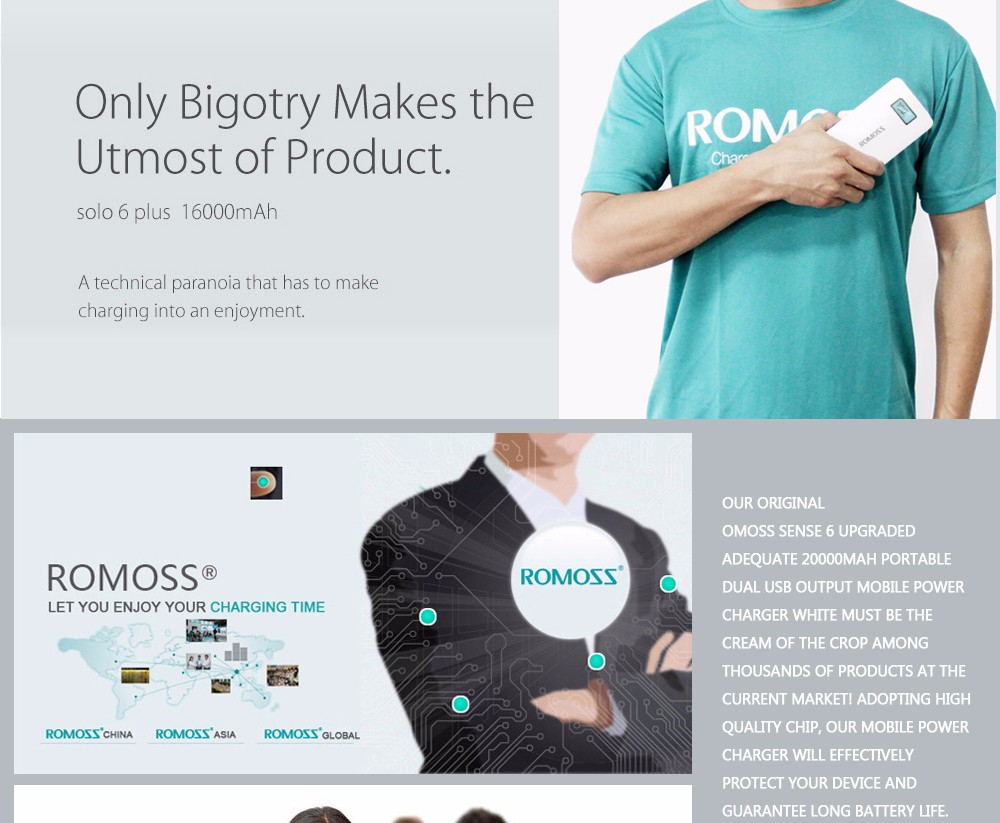Charged with prejudice and paranoia
« previous post | next post »
Peculiar ad for a portable charger from AliExpress:
The same ad for an earlier model of the charger appears here.
Since AliExpress is a Chinese mail order site, and since there is good evidence that these products are Chinese fakes (see the discussion in the comments section here), I suspect that this may be a Chinglish translation. I haven't been able to locate the original Chinese text, but I will give here some suggestions for the basic terms in the ad should anyone wish to try to do a back translation into Chinese.
bigotry 偏 執 piānzhí
utmost 最(大) zuì(dà)
product 產品 chǎnpǐn
technical 技術 jìshù
paranoia 偏執狂 piānzhíkuáng
charging 充 電 chōngdiàn
enjoyment 享受 xiǎngshòu
Even if we don't discover what the original Chinese was (maybe there never was an original Chinese text), the wording of the ad is sufficiently amusing to warrant bringing it to the attention of Language Log readers.
[h.t. Matthias Neeracher]

Bob Ladd said,
October 24, 2015 @ 12:13 pm
Could bigotry be an attempt at something like bifunctionality or something like that – i.e. with bigotry analysed by a non-native speaker as containing the prefix bi-? The ad seems to be suggesting you can be charging a device and using another at the same time (or something like that).
Just a thought.
SistaRay said,
October 24, 2015 @ 12:28 pm
Hmmm. Thesaurus offers bigotry as a synonym for discrimination which has also a positive meaning: the ability to judge what is good, true, etc.
As to paranoia – an extreme form of vigilance or diligence?
j2h said,
October 24, 2015 @ 12:34 pm
I've located a similar image with Chinese text:
http://cbu01.alicdn.com/img/ibank/2015/874/257/2341752478_1062815746.jpg
found here:
http://detail.1688.com/offer/520929472391.html?spm=0.0.0.0.OnoQ7k
The text in Chinese is:
偏执才能将产品做到极致
必须将充电变成享受的技术偏执狂
Victor Mair said,
October 24, 2015 @ 1:26 pm
Thank you very much for finding that!
Here's a tentative translation:
piānzhí cái néng jiāng chǎnpǐn zuòdào jízhì 偏执才能将产品做到极致 ("only persistence can bring the making of a product to perfection")
bìxū jiāng chōngdiàn biànchéng xiǎngshòu de jìshù piānzhíkuáng 必须将充电变成享受的技术偏执狂 ("it will certainly turn the technology paranoia of charging electricity into enjoyment")
SistaRay said,
October 24, 2015 @ 1:58 pm
Persistence = perseverance = attention to detail = care = discrimination
In the Chinese sentence I would probably translate paranoia with nightmare.
Victor Mair said,
October 24, 2015 @ 2:48 pm
I asked Rebecca Shuang Fu if she thought the second line was a bit awkward. Here's her reply:
=====
The second line is well written.
It means: [We are] technology paranoids who must turn/transform power charging into enjoyment.
This is because, while enjoying the joy and convenience of modern gadgets like iphone, ppl have to put up with the inconvenience of power charging. For example, if the power of my iphone runs out one min prior to the train boarding, I will possibly be turned off the train by an Amtrak conductor.
Do I make sense?
Victor Mair said,
October 24, 2015 @ 2:50 pm
Ben Zimmer found additional Chinese ad copy that is relevant to the English translation:
zhuānzhù chōngdiàn de jìshù piānzhí kuáng 专注充电的技术偏执狂 ("focus on charging technology paranoia")
http://goo.gl/C89Mka
Victor Mair said,
October 24, 2015 @ 3:05 pm
This ad reminds me of the gravelly pontifications of the speaker extolling a new Chinese electronic watch here:
"Smartisan T1" (3/8/15)
http://languagelog.ldc.upenn.edu/nll/?p=18024
Victor Mair said,
October 24, 2015 @ 3:26 pm
From Jing Wen (pinyin and translations added by VHM):
=====
These Chinese expressions are odd to me. I don't think the word piānzhí 偏执 ("bigoted; paranoid") has any positive meaning itself. I think it is better to say "zhízhuó (or jiānchí) cáinéng jiāng chǎnpǐn zuò dào jízhì 执着(or 坚持)才能将产品做到极致" ("only persistence [or insistence] can bring the making of a product to the acme / utmost"). As for the second one, I even cannot understand what chōngdiàn 充电 ("charging") means. If it means charging (cell phones, laptops, etc.), I don't understand why it is related to enjoyment. Who enjoys charging? The cell phone?
Victor Mair said,
October 24, 2015 @ 3:30 pm
From Fangyi Cheng:
=====
I think the second line can also be translated as "the technology paranoia* who must turn the charging electricity into enjoyment." From this understanding, the second Chinese line is not so clumsy.
=====
*I think that he means "paranoid".
JS said,
October 24, 2015 @ 7:25 pm
偏执才能将产品做到极致
必须将充电变成享受的技术偏执狂
perfection of a product requires pigheadedness
we, the technology-pigheaded, who insist on making recharging fun
Rubrick said,
October 25, 2015 @ 2:18 am
Somehow the classy, modern, Apple-esque font makes the preposterous English that much more ridiculous.
Victor Mair said,
October 25, 2015 @ 6:19 am
Yep, Rubrick, the outrageous English is an affront to the sleek design, which they stole whole-hog (cf. JS's "pigheadedness"), since it stands in such clumsy contradiction to it.
GH said,
October 25, 2015 @ 11:40 am
Compare perhaps the use of "Nazi" to refer to people obsessed with detail and procedure.
Bathrobe said,
November 4, 2015 @ 5:51 pm
As Professor Mair points out, it seems to me the problem here is 偏执, which is being used in a slightly different nuance from "paranoia". It seems to be referring to an excessive obsession with detail, and the person who is so afflicted is presumably a technology freak (hence the 狂) or geek. Perhaps someone like Steve Jobs? Only this level of obsession can produce "insanely" great products.